ChatGPT is about to get an incredibly exciting upgrade, but one that’s also rather scary right now. OpenAI announced that its generative AI software will know who you are and remember your preferences for future interaction. The feature will be limited to ChatGPT Plus, however, the subscription-based version, which is also the most powerful one. As a reminder, ChatGPT Plus runs on GPT-4, the most advanced language model OpenAI released in the wild. This version is also connected to the live internet.
There’s no doubt in my mind that we’re heading to a future where every smart device will have AI capabilities. The generative AI that will matter most to the user will also be highly personal.
Think of an advanced version of Siri running across all your Apple devices, knowing all your preferences, and capable of catering responses to meet those needs. A similar version of Google Assistant AI could run on Google devices, including Android and Chromebooks. Microsoft has Bing Chat and Copilot, running on OpenAI’s ChatGPT tech.
Before we get there, we’ll experience personalized generative AI via these early efforts. And since we’re in the early days, and OpenAI is doing it, you’d be right to be worried about ChatGPT knowing who you are better than any algorithm.
That’s because privacy hasn’t been exactly a core ChatGPT feature. OpenAI would like as much access to data as possible to train its algorithms. That’s why the first versions of ChatGPT didn’t let you turn off the data collection from your chat with the bot.
Therefore, giving ChatGPT Plus the ability to remember who you are sounds like a privacy nightmare already. One you’d be paying $20/month for. Again, only ChatGPT Plus subscribers will get the feature.
But ChatGPT won’t be spying on you, collecting data without your knowledge. Instead, you’ll be able to have the chatbot remember very specific information about you for future interactions. That way, you won’t have to repeat the same information about yourself with each prompt.
ChatGPT offers the following examples in its announcement that highlights the kind of use cases it has in mind for ChatGPT’s personalization:
For example, a teacher crafting a lesson plan no longer has to repeat that they’re teaching 3rd grade science. A developer preferring efficient code in a language that’s not Python – they can say it once, and it’s understood. Grocery shopping for a big family becomes easier, with the model accounting for 6 servings in the grocery list.
ChatGPT Plus users will find the “custom instructions” menu above if they have access to the beta. The feature won’t roll out to all Plus subscribers yet. Just toggle it on, and then tell the bot what you’d like it to remember for your future interactions.
Here’s what a prompt would look like for the teacher taking advantage of the custom instructions. Notice how ChatGPT already knows he/she is a 3rd-grade teacher:

OpenAI also confirms that it may use data from custom instructions to improve ChatGPT. But users should be able to disable this feature via data controls:
That said, it’s up to you to let ChatGPT remember who you are and what you like. I think this should be the next step for any generative AI software out there. The only way for AI to act as an efficient assistant is to know who you are and remember your preferences. User privacy is the only worry I have right now since we’re still in the very early days of ChatGPT-like products.

